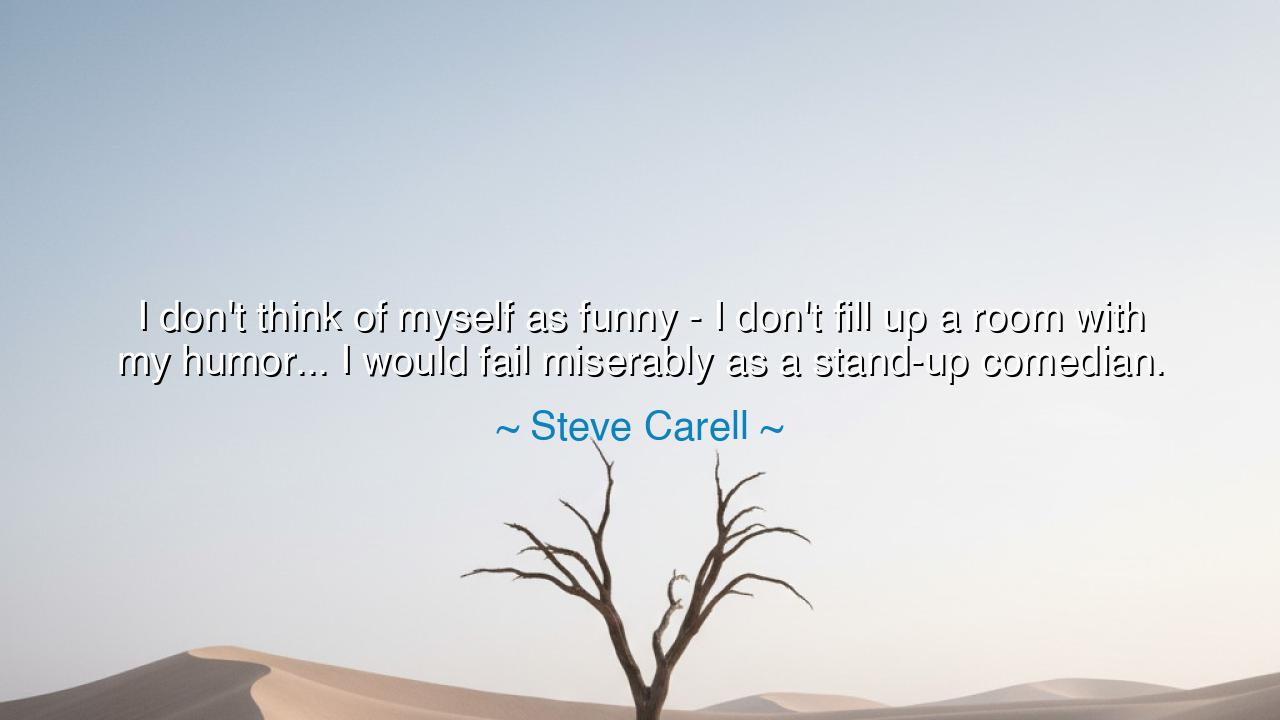
I don't think of myself as funny - I don't fill up a room with my
I don't think of myself as funny - I don't fill up a room with my humor... I would fail miserably as a stand-up comedian.






The words of Steve Carell carry the humility of a man who understands the delicate nature of laughter and the mystery of human connection: “I don’t think of myself as funny — I don’t fill up a room with my humor... I would fail miserably as a stand-up comedian.” Though these words seem simple, they reveal a profound truth about art, authenticity, and the essence of character. Carell, known to the world for his ability to make millions laugh, reminds us that true humor is not born from noise or dominance, but from sincerity — from a quiet understanding of the human heart.
In a world that often confuses loudness with charisma and constant performance with creativity, Carell’s reflection feels like ancient wisdom. He reminds us that humor, in its purest form, is not something to be projected outward, but something that flows naturally from empathy and observation. The comedian who relies on the self’s hunger for attention burns bright but briefly; the one who draws laughter from truth endures. Carell’s humility reflects this truth — that the most powerful laughter is not forced, but earned through authenticity. It is not the voice that fills a room that matters, but the heart that touches those who listen.
In the traditions of old, the fool was not merely an entertainer, but a philosopher disguised in jest. The ancient courts of kings often kept jesters not because they craved laughter, but because through laughter came honesty. The jester’s humor was not loud, but wise — it carried the subtle power to reveal truth without offense. Steve Carell, though a modern man, stands in this lineage. His comedy — often gentle, awkward, even painful — mirrors the ancient art of revealing humanity’s frailty through humility. He does not command laughter; he invites it. Like the fool of old, he shows that vulnerability is a greater stage than any spotlight.
To say “I am not funny” while being one of the most beloved comedians of his time is not contradiction — it is enlightenment. For Carell understands that laughter is not a mask he wears, but a mirror he holds. The humor that lives in his work, from Michael Scott’s desperation in The Office to the tender restraint of The 40-Year-Old Virgin, comes not from arrogance, but from truth. His characters make us laugh because they reflect our own contradictions — the longing to be loved, the fear of rejection, the absurdity of trying to be something we are not. In his words, we see a man who knows that comedy is not performance, but empathy expressed in laughter’s form.
This humility recalls the story of Charlie Chaplin, the silent master of comedy. Though he made the world roar with laughter, Chaplin himself was a man of quiet intensity. He once said, “I remain just one thing, and one thing only — and that is a clown. It places me on a far higher plane than any politician.” Like Carell, he understood that to be truly funny is not to seek laughter, but to reveal truth. When he stumbled, people saw themselves. When he smiled through sorrow, they found hope. Both men teach us that the greatest humor is born from compassion, not ego.
The lesson, then, is this: greatness does not require one to fill the room. It requires one to fill the heart. Whether in art, conversation, or life, the goal is not to dominate but to connect. Do not strive to be the loudest, but the most genuine. When you speak, let your words carry warmth, not noise; when you act, let your deeds reflect humility, not hunger. If laughter follows, it will be real — not the laughter of performance, but of recognition. Steve Carell’s wisdom reminds us that joy shared from sincerity endures longer than applause born of vanity.
And so, dear listener, take these words as a quiet call to authenticity. You need not fill a room to make an impact. You need not wear the mask of the entertainer to bring light into others’ lives. The world needs fewer performers and more storytellers, fewer loud voices and more honest hearts. Let your humor come from kindness, your confidence from truth, and your humility from understanding. For as Steve Carell teaches, to be truly funny is not to seek laughter — it is to understand life so deeply that others cannot help but laugh with recognition.
Thus, remember: it is not the noise of the performer that lingers, but the quiet wisdom of the observer. Be like the wise fool of old — sincere, gentle, and brave enough to reveal your own humanity. For in that vulnerability lies the purest kind of laughter, and in that laughter, the timeless power to heal, to connect, and to endure.






AAdministratorAdministrator
Welcome, honored guests. Please leave a comment, we will respond soon